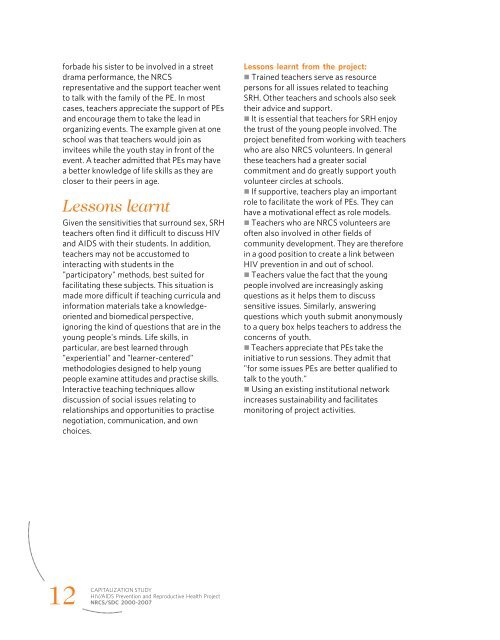HIV/AIDS Prevention & Reproductive Health Project
HIV/AIDS Prevention & Reproductive Health Project
HIV/AIDS Prevention & Reproductive Health Project
You also want an ePaper? Increase the reach of your titles
YUMPU automatically turns print PDFs into web optimized ePapers that Google loves.
forbade his sister to be involved in a street<br />
drama performance, the NRCS<br />
representative and the support teacher went<br />
to talk with the family of the PE. In most<br />
cases, teachers appreciate the support of PEs<br />
and encourage them to take the lead in<br />
organizing events. The example given at one<br />
school was that teachers would join as<br />
invitees while the youth stay in front of the<br />
event. A teacher admitted that PEs may have<br />
a better knowledge of life skills as they are<br />
closer to their peers in age.<br />
Lessons learnt<br />
Given the sensitivities that surround sex, SRH<br />
teachers often find it difficult to discuss <strong>HIV</strong><br />
and <strong>AIDS</strong> with their students. In addition,<br />
teachers may not be accustomed to<br />
interacting with students in the<br />
"participatory" methods, best suited for<br />
facilitating these subjects. This situation is<br />
made more difficult if teaching curricula and<br />
information materials take a knowledgeoriented<br />
and biomedical perspective,<br />
ignoring the kind of questions that are in the<br />
young people's minds. Life skills, in<br />
particular, are best learned through<br />
"experiential" and "learner-centered"<br />
methodologies designed to help young<br />
people examine attitudes and practise skills.<br />
Interactive teaching techniques allow<br />
discussion of social issues relating to<br />
relationships and opportunities to practise<br />
negotiation, communication, and own<br />
choices.<br />
Lessons learnt from the project:<br />
• Trained teachers serve as resource<br />
persons for all issues related to teaching<br />
SRH. Other teachers and schools also seek<br />
their advice and support.<br />
• It is essential that teachers for SRH enjoy<br />
the trust of the young people involved. The<br />
project benefited from working with teachers<br />
who are also NRCS volunteers. In general<br />
these teachers had a greater social<br />
commitment and do greatly support youth<br />
volunteer circles at schools.<br />
• If supportive, teachers play an important<br />
role to facilitate the work of PEs. They can<br />
have a motivational effect as role models.<br />
• Teachers who are NRCS volunteers are<br />
often also involved in other fields of<br />
community development. They are therefore<br />
in a good position to create a link between<br />
<strong>HIV</strong> prevention in and out of school.<br />
• Teachers value the fact that the young<br />
people involved are increasingly asking<br />
questions as it helps them to discuss<br />
sensitive issues. Similarly, answering<br />
questions which youth submit anonymously<br />
to a query box helps teachers to address the<br />
concerns of youth.<br />
• Teachers appreciate that PEs take the<br />
initiative to run sessions. They admit that<br />
"for some issues PEs are better qualified to<br />
talk to the youth."<br />
• Using an existing institutional network<br />
increases sustainability and facilitates<br />
monitoring of project activities.<br />
12<br />
CAPITALIZATION STUDY<br />
<strong>HIV</strong>/<strong>AIDS</strong> <strong>Prevention</strong> and <strong>Reproductive</strong> <strong>Health</strong> <strong>Project</strong><br />
NRCS/SDC 2000-2007

















